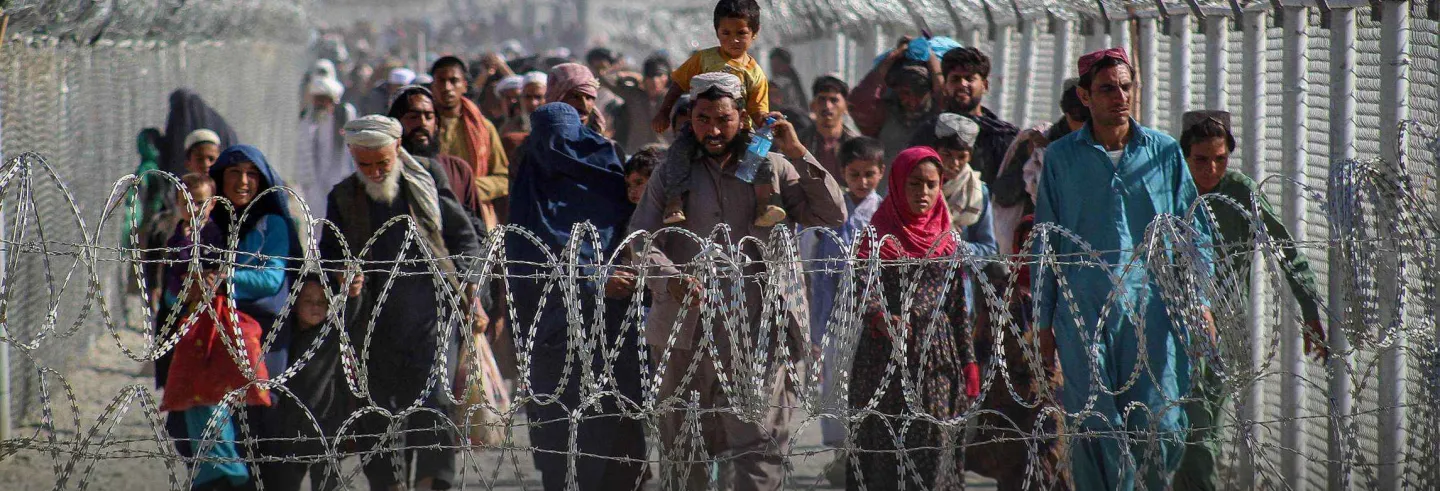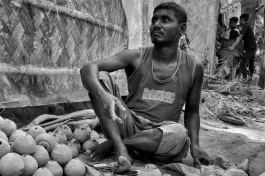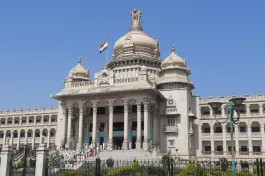History repeats itself, again. Without question, this is the trope of the moment for those interested in contemporary geopolitics and international relations. The corresponding meme, for those more digitally minded, is the image of the “last helicopter” taking off from the roof of the US Embassy in Saigon, prefiguring the fall of the US-supported Republic of South Vietnam in 1975. The chaotic and deadly withdrawal of US military forces from Afghanistan has pundits from across the political spectrum describing this ongoing moment as 'another Saigon.' Some may welcome the departure of US 'occupation' forces, others focus on the 'betrayal' of Afghan civil society and women, while still others consider this moment a 'pragmatic' end to a deeply flawed two decade-long exercise in nation-building.
Regardless of political and policy persuasion, it appears that the 'fall of Saigon' is the go-to historical example from which to make sense of this latest turn in the long saga of imperial overreach in the Global South.
[B]e on guard when historical examples are invoked, whether as object lesson or to add verisimilitude to the arguments of expert commentators.
That this moment also coincides with the recent official visit of US Vice President Kamala Harris to Vietnam is less commented on. The contrast between Vietnam as yesterday’s implacable enemy and today’s near-ally should remind us that the shelf life of expert prognoses is much shorter than most armchair warriors would care to admit. What is more disturbing as we try to make sense of recent events is how 'history' has become both unwitting victim and ready accomplice. This appropriation is not new. The history of Anglo-American international relations is especially replete with the abuse of historical analogies, which include 'lessons' from Thucydides’ account of tiny ancient slave-owning Greek city states being extrapolated directly to explain our global world, and above all, the term 'appeasement' with its ever-ready invocation of Hitler and the Holocaust as the lurking danger if policy makers do not heed [fill in name here]’s sage advice.
In short, be on guard when historical examples are invoked, whether as object lesson or to add verisimilitude to the arguments of expert commentators. (Needless to say, this statutory warning includes this piece.)
Does 'the fall of Saigon' offer any lessons for understanding today’s crisis? We shall see. My starting point is to go beyond the potent trope and to remind us of some of the actual events that followed the end of the South Vietnam state. I have selected only a few examples to compare then and now, but they offer a useful perspective to consider what may yet take place in Afghanistan and its immediate neighborhood in the near and distant future.
Waves of refugees
Images that came out of Kabul foregrounded Afghans seeking to escape what they feared would be retribution or worse from the incoming Taliban government and militias. These images are a vivid reminder of what took place after the fall of Saigon, when hundreds of thousands of South Vietnamese sought to flee the country. Some were former officials, many were Catholic, others were well-to-do ethnic Chinese or belonged to the non-communist opposition. What many have forgotten is that rather than a single moment when refugees sought to leave, refugee outflows took place in waves. Some left immediately, as today’s pictures show, but others took much longer to decide that flight was their best option. Waves of refugees fled the south between 1975 and 1979, creating the humanitarian emergency now remembered as the Indochina boat people crisis.
These new refugees are unlikely to contribute to their host country GDPs in the same way as did the Vietnamese resettled in the west.
Regional states, banding together under the Association of Southeast Asian Nations (ASEAN), refused to take any responsibility beyond the absolute minimum for looking after successive waves of refugees. The pressure they placed on the international community to take responsibility for their failures would eventually lead to the US and other western allies absorbing these displaced persons. Ironically, in the end it could be argued that these initially unwilling hosts unwittingly got a very good deal, with generations of Vietnamese refugees contributing enormously to their new homes, especially economically.
Afghanistan’s neighbours, especially Pakistan and Iran, have long hosted millions of Afghans fleeing war, political turmoil, oppressive social conditions, and impoverishment. Both these countries can expect new flows of refugees to continue for some years to come, with the costs to Pakistan, materially and politically, being much higher. These new refugees are unlikely to contribute to their host country GDPs in the same way as did the Vietnamese resettled in the west. This new influx is likely to stoke social — and hence, political — tensions for reasons of refugee fatigue, ethnic politics, and ideology. The refugee crisis will be protracted but the chances of a coordinated, well-funded and long-term international response involving aid and resettlement for Afghan refugees are far less likely, once the current moment is past. Pakistan and Iran are going to have to handle this protracted humanitarian emergency on their own, as they have before.
Regional inclusion and instabilities
When Saigon fell, the (then) five members of ASEAN were staunchly anti-communist. They saw in a unified Vietnam under communist rule a revolutionary state seeking to sow instability and support leftist insurgencies across the region. Apparent proof of their fears emerged when Vietnam invaded Cambodia, a country then being systematically torn apart by the tyrannical Pol Pot regime. ASEAN fears of Vietnam were so great that they supported the Khmer Rouge and banded together to join forces against the Vietnamese at the UN. That Vietnam’s occupation ended the genocide of the Cambodian people, in retrospect an early and forgotten example of the Responsibility to Protect, was of little importance in the face of overblown regional anxieties.
The question that no one has an answer to at this time is whether the Taliban will be a regime that seeks to export its revolution or whether it will be satisfied with consolidating power locally.
Just as the Vietnamese state was feared for its likely support of regional insurgencies, the dominant perception of the Taliban is that of a radical regime seeking to instigate political upheaval abroad. But it is unlikely that Afghanistan’s neighbours will band together to isolate and pressure the new Taliban regime, as ASEAN did Vietnam. More likely, a renewed struggle for outside influence in Kabul will break out, partly out of self-protection and partly out of the desire to seek new economic opportunities. The multilateral forum to watch will be the Shanghai Cooperation Organization (SCO), a China-led grouping of states that includes all Afghanistan’s immediate neighbours as well as Russia and India. Afghanistan, now an observer to the SCO, will most likely be granted member status before long. International legitimation and regional inclusion will come much sooner for Afghanistan than it did for Vietnam, which was only admitted into ASEAN in 1995, two decades after unification.
While rapid inclusion in the SCO might lower regional tensions and benefit a number of countries, most notably the Chinese mining and infrastructure industries, the fear of an insurrectionist foreign policy emanating out of Kabul will not dissipate immediately. The question that no one has an answer to at this time is whether the Taliban will be a regime that seek to export its revolution or whether they will be satisfied with consolidating power locally. The answer lies first in the leadership and lessons learned from decades in exile. Having had a taste of the good life may have changed the leadership’s larger ambitions. But outcomes will also be modulated by transnational militant movements not entirely beholden to the Taliban and emboldened by military success. It cannot be forgotten that wars are slow to end even after peace accords have been duly signed.
Regime identity
It is now widely agreed that an important reason for the American failure in Vietnam was a profound misunderstanding of who they were fighting against. For the US, this was a war against Asian communists and their allies. For the Vietnamese, the period after the Second World War was taken over by civil war and multiple wars of national liberation, fought first against French colonial forces followed by their American successors, both in alliance with local enemies, the elites, anti-communists, conservatives, and religious Vietnamese. It was the overarching and existential imperative of national liberation that gave the North Vietnamese forces their extraordinary staying power, notwithstanding tremendous and unequal odds. And while communism never went away as a ruling ideology and Leninism is critical for understanding domestic politics in Vietnam today, ideology and fraternal brotherhood did not prevent the country from soon fighting a war against a fellow communist state and former ally, China. And, as any visitor to Hanoi will confirm, the Vietnamese economy is far more capitalist than otherwise. Labels can hide more than they reveal.
There is certainly some evidence to make the case that to reduce the Taliban to Islamic fundamentalists is far too simplistic.
What are the Taliban? In the dominant external narrative they are of course radical Islamists, pure and simple. But is that description adequate to understand what drove the Taliban to fight first the Soviets and then the Americans over a period of four decades? Should the Taliban not also be seen also as Afghan nationalists, making this in effect the most recent war of postcolonial liberation? There is certainly some evidence to make the case that to reduce the Taliban to Islamic fundamentalists is far too simplistic. Most obviously, there is their popular support. Whether we find it uncomfortable to admit or not, no armed movement can last as long as the Taliban have done without considerable popular support. The extent and depth of that support is unclear but cannot be unlinked from the evidence of their deep commitment to resist external domination, their provision of local justice in the face of massive state corruption, and their support of the mainstay of the Afghan agricultural sector: opium farming.
Whether popular support will last once the Taliban transform from insurgents to rulers is an open question, but the larger point here is to question the dominant narrative of the Taliban as nothing more than single-minded fanatics devoted to wiping out all traces of anything un-Islamic or unorthodox from a sectarian point of view.
This leads directly to the economy and the issue of opium. By no stretch of imagination can opium be considered halal. When the Taliban first came to power, they wiped out the opium trade. Later, they came to rely on it as taxable revenue and to keep the support of the farmers whose livelihoods depended on it. Will this tendency toward ideological compromise continue? Without question, opium production will be one of the pressure points the international community will apply on the new government to discipline it. The Taliban will probably respond in the way that Myanmar (another ASEAN member) does with respect to the massive domestic production of illegal drugs, namely, to disavow the policy officially but privately to tolerate and benefit from opium revenues. But this will only add to the pressure to diversify their economic base.
Four decades from now we may well see another US vice-president land in Kabul airport, now transformed into a state-of-the-art logistical hub for Central Asia...
This need provides an opening for regional superpowers such as China. Political instability has long prevented Afghanistan’s natural and mineral resources from being fully exploited. With the Taliban in power, Chinese corporations will seek to enter Afghanistan in a much more sustained way than at present. Does this mean that China is the next empire to be dragged to its downfall in the Hindu Kush? India and the US would certainly hope so, and the growing resistance to China’s infrastructural investments in Baluchistan and Africa provide clues that the Belt and Road Initiative model leaves much to be desired. But it is far too early to tell how things will transpire.
This is why it is important to be reminded of the uncanny juxtaposition of Kabul-today-as-Saigon-in-1975 and the visit of US Vice President Kamala Harris to an economically vibrant pro-US Hanoi in 2021. While imperial outrage and the blame-game roils Washington today, it will not last. Four decades from now we may well see another US vice president land in Kabul airport, now transformed into a state-of-the-art logistical hub for Central Asia, the past not so much forgotten as conveniently ignored.
History repeats itself, again?
Notwithstanding the famous prognostications of Marx, Santayana, and others, history does not repeat itself. What histories mean are what we put into them. Our choices of historical examples are far more telling than the meanings attributed to them, especially when the relevant example is merely proclaimed, not interrogated. What we can count on, however, is that history’s eternal shadow, namely, the future, will always throw up surprises no matter how carefully we curate the past to tell us what we want to believe.









